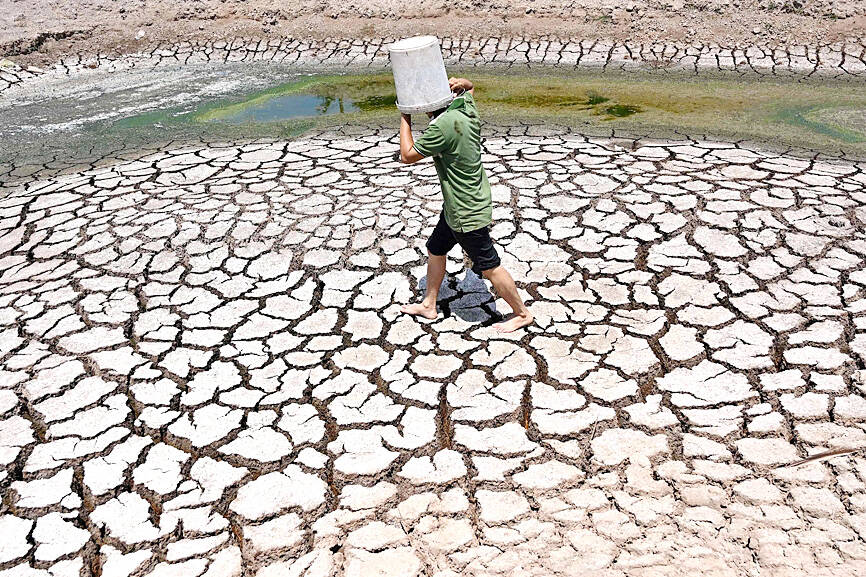For the 10th consecutive month, Earth last month set a new monthly record for global heat — with both air temperatures and the world’s oceans hitting an all-time high for the month, the EU climate agency Copernicus said.
Last month the temperature averaged 14.14°C, exceeding the previous record from 2016 by 0.1°C, Copernicus data showed.
It was 1.68°C warmer than in the late 1800s, the base used for temperatures before the burning of fossil fuels began growing rapidly.

Photo: AFP
Since June last year, the globe has broken heat records each month, with marine heat waves across large areas of the globe’s oceans contributing.
The record-breaking heat during this time was not entirely surprising due to a strong El Nino, a climatic condition that warms the central Pacific and changes global weather patterns.
“But its combination with the non-natural marine heat waves made these records so breathtaking,” Woodwell Climate Research Center scientist Jennifer Francis said.
With El Nino waning, the margins by which global average temperatures are surpassed each month should go down, Francis said.
Climate scientists attribute most of the record heat to human-caused climate change.
“The trajectory will not change until concentrations of greenhouse gases in the atmosphere stop rising, which means we must stop burning fossil fuels, stop deforestation and grow our food more sustainably as quickly as possible,” Francis said.
Until then, expect more records to be broken, she said.
The 2015 Paris Agreement set a goal to keep warming at or below 1.5°C since preindustrial times.
Copernicus deputy director Samantha Burgess said last month’s record-breaking temperature was not as exceptional as some other months in the past year that broke records by wider margins.
“We’ve had record-breaking months that have been even more unusual,” Burgess said, pointing to February and September last year.
The globe has now experienced 12 months with average monthly temperatures 1.58°C above the Paris threshold, data showed.
Last month, global sea surface temperature averaged 21.07°C, the highest monthly value on record and slightly higher than February.
“We need more ambitious global action to ensure that we can get to net zero as soon as possible,” Burgess said.

Airlines in Australia, Hong Kong, India, Malaysia and Singapore yesterday canceled flights to and from the Indonesian island of Bali, after a nearby volcano catapulted an ash tower into the sky. Australia’s Jetstar, Qantas and Virgin Australia all grounded flights after Mount Lewotobi Laki-Laki on Flores island spewed a 9km tower a day earlier. Malaysia Airlines, AirAsia, India’s IndiGo and Singapore’s Scoot also listed flights as canceled. “Volcanic ash poses a significant threat to safe operations of the aircraft in the vicinity of volcanic clouds,” AirAsia said as it announced several cancelations. Multiple eruptions from the 1,703m twin-peaked volcano in

Farmer Liu Bingyong used to make a tidy profit selling milk but is now leaking cash — hit by a dairy sector crisis that embodies several of China’s economic woes. Milk is not a traditional mainstay of Chinese diets, but the Chinese government has long pushed people to drink more, citing its health benefits. The country has expanded its dairy production capacity and imported vast numbers of cattle in recent years as Beijing pursues food self-sufficiency. However, chronically low consumption has left the market sloshing with unwanted milk — driving down prices and pushing farmers to the brink — while

China has built a land-based prototype nuclear reactor for a large surface warship, in the clearest sign yet Beijing is advancing toward producing the nation’s first nuclear-powered aircraft carrier, according to a new analysis of satellite imagery and Chinese government documents provided to The Associated Press. There have long been rumors that China is planning to build a nuclear-powered aircraft carrier, but the research by the Middlebury Institute of International Studies in California is the first to confirm it is working on a nuclear-powered propulsion system for a carrier-sized surface warship. Why is China’s pursuit of nuclear-powered carriers significant? China’s navy is already

‘SIGNS OF ESCALATION’: Russian forces have been aiming to capture Ukraine’s eastern Donbas province and have been capturing new villages as they move toward Pokrovsk Ukrainian Commander-in-Chief Oleksandr Syrskyi on Saturday said that Ukraine faced increasing difficulties in its fight against Moscow’s invasion as Russian forces advance and North Korean troops prepare to join the Kremlin’s campaign. Syrskyi, relating comments he made to a top US general, said outnumbered Ukrainian forces faced Russian attacks in key sectors of the more than two-and-a-half-year-old war with Russia. Ukrainian President Volodymyr Zelenskiy in a nightly address said that Ukraine’s military command was focused on defending around the town of Kurakhove — a target of Russia’s advances along with Pokrovsk, a logistical hub to the north. He decried strikes